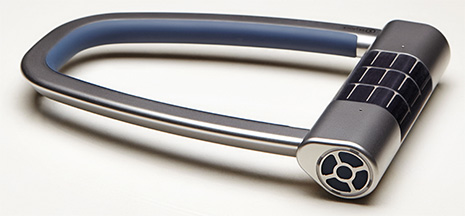The Aero-X hoverbike from Aerofex
A look at gadget happenings, as the world of transport is transformed by hoverbikes, briefcase bikes and a keyless bike lock, a UK company launches a 3D-printed Braille phone, and Fallout’s Pip-Boy 3000 becomes a reality.
Sales of the Aero-X hoverbike to take off in 2017
Hype for the Aerofex Aero-X hoverbike started building in 2012 when a working prototype was first demonstrated. Since then, Aerofex has been refining the vehicle’s stability and filing patents, and it was revealed last week it will be ready for commercial release in 2017.
The Aero-X hoverbike rides like a motorcycle and is capable of flying up to 3m off the ground at 72kph, thanks to its ducted rotors with carbon-fibre blades. Safety features are included to prevent drivers from flying too high or too fast, in order to comply with the US Federal Aviation Administration’s guidelines.
About the size of a small car, the Aero-X provides seating for two and is capable of carrying up to 140kg in weight, and on a full tank drivers will get 75 minutes of transport.
Pricing has also been announced for the Aero-X hoverbike and, as you may have guessed, it won’t come cheap. The hovercraft will cost US$85,000 on its release, while a refundable deposit of US$5,000 will keep one in reserve.
Bike Intermodal’s ‘briefcase bike’
Hoverbikes aren’t for everyone, of course, but with the popularity of standard bicycles increasing, the EU has contributed €1.58m in research funding for Bike Intermodal’s electrically assisted bicycle, which can fold up to the size of a briefcase.
Bike Intermodal introduced its first commercially viable prototype last week and the start-up is in discussions with VCs and prominent players in the automotive industry to take it to market.

The ‘intermodal bicycle’ has been built using fully recyclable parts and reinforced through limiting the number of parts and using magnesium, a resistant but light material. “It is light and compact enough to take everywhere so that owners need never worry about storing it or locking it – they can keep it with them wherever they go,” said James Harrington, founder of Cycle Ireland. “It’s a great new option for cycle commuters everywhere.”
The pre-stressed frame opens and closes like aircraft landing gear and the start-up is looking at the possibility of using graphene in future models, which will make the frame even lighter and stronger.
Currently, the power-assisted fold-up bike is expected to cost €1,500, while a version without a motor will cost €1,000 when it hits the market.
Smart security for bikes
For bicycles on the streets right now, security can be a challenge. To tackle this, Velo Labs is seeking to crowdfund a keyless lock that will alert you if someone tries to nick your two-wheeled transportation.
Skylock is a ‘smart’ U-lock that is opened by pressing a button on a companion app, or by using proximity settings to automatically unlock when a paired smartphone is nearby. For those moments when your smartphone is lost, dead or otherwise unavailable, the Skylock can be unlocked using a code entered onto the capacitive touch pad.

Skylock is solar-charged, so should never run out of juice, and a built-in accelerometer will let you know via the app if someone’s messing with your lock when they shouldn’t be. This sensor can also detect if you crash (heaven forbid), prompting a single-tap call for help via your smartphone, if you need it. What’s more, you can use Skylock to set up your very own bike network by allowing access to multiple users – Dublin Bikes be damned.
Should the company successfully raise the required US$50,000, Skylock is due to launch early next year at a retail cost of US$249, but crowdfunders will get it for US$159.
3D-printed Braille phone
In mobile phone news this past week, London-based company OwnFone has released a 3D-printed Braille phone, which could be the first of its kind on the market. The front and back of the phone is 3D-printed and can be customised to produce a raised-text keypad for those who can’t read Braille.
Inventor Tom Sunderland explained to BBC News that two to four Braille buttons can be included on the device, which can be pre-programmed to call friends, family, carers or emergency services. This follows the format of OwnFone’s previous devices, such as a 3D-printed phone for kids programmed only to dial selected numbers.

So far, this release is only available in the UK at a cost of stg£60, but it’s a clever, low-cost solution that would be great to see gaining traction elsewhere.
Science fiction becomes reality
Finally, we leave you with a glimpse at this covetable gadget for fans of the Fallout video-game series. As part of US space agency NASA’s SpaceWearables challenge, a team of coders created a 3D-printed Pip-Boy 3000 – a wrist-worn device worn by characters in Fallout 3.
Team Reno’s Pip-Boy 3000 is fitted with sensors that would let the wearer know if their environment is safe for navigation or helmet removal. The prototype device uses an iPhone 5 with Bluetooth Low Energy at its core, and an app provides the Pip-Boy interface and environmental information regarding relative humidity, altitude, latitude, longitude, atmospheric pressure, ambient temperature, object temperature and radiation. For these readings, the device includes a home-made Geiger counter and a Pinnoc.io microcontroller.
The project is open source, welcoming other developers to add their own apps and, if you want to build your own, all of the source code is available on GitHub and the 3D printing files are free to download from Thingiverse.
Stay informed – get daily updates on the latest happenings in technology directly to your inbox.